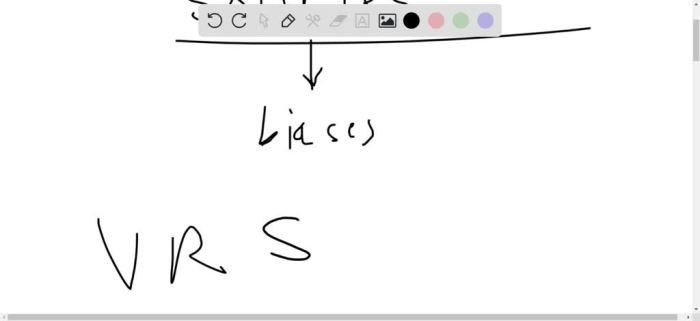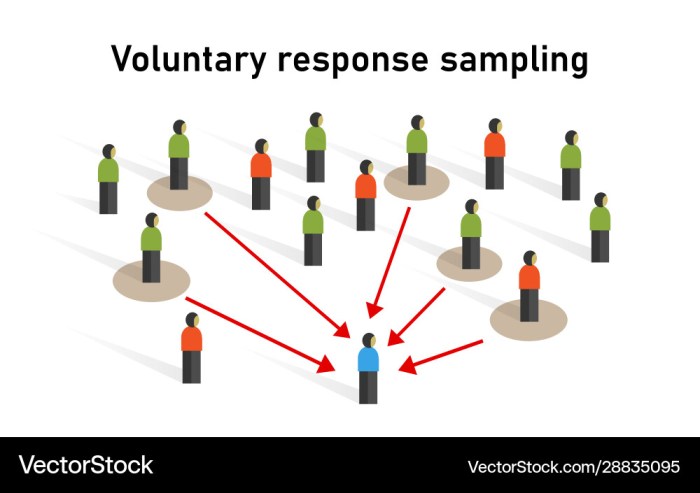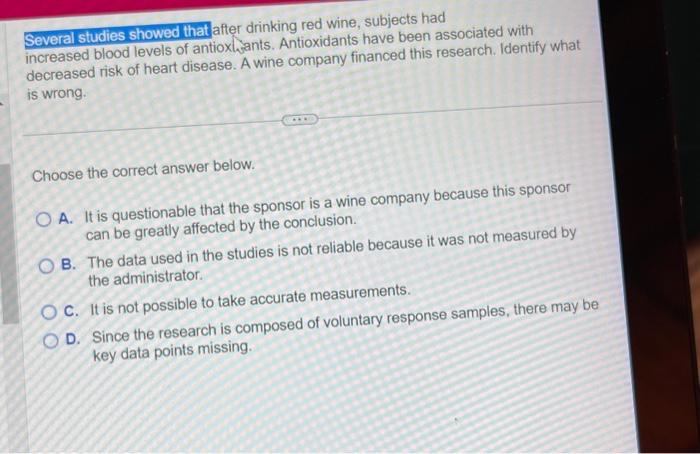Inferences based on voluntary response samples are generally not reliable. – Inferences based on voluntary response samples are generally not reliable, a fact that can lead to inaccurate conclusions and misguided decision-making. This limitation stems from inherent biases that plague such samples, undermining their representativeness and validity.
Voluntary response samples are inherently biased due to self-selection, where individuals who choose to participate may differ significantly from those who do not. This can introduce selection bias, skewing the results and potentially leading to erroneous inferences.
Introduction

Voluntary response samples are a type of non-probability sample in which individuals choose to participate in a survey or study. While these samples can be convenient and cost-effective, they are prone to bias and do not provide a reliable basis for inferences about a population.
The main thesis of this article is that inferences based on voluntary response samples are generally not reliable due to the presence of selection bias and non-response bias.
Sources of Bias in Voluntary Response Samples, Inferences based on voluntary response samples are generally not reliable.
Selection Bias
Selection bias occurs when the individuals who choose to participate in a voluntary response sample are not representative of the population of interest. This can happen for a variety of reasons, such as:
- People who are more interested in the topic of the survey are more likely to participate.
- People who have strong opinions on the topic are more likely to participate.
- People who have time to participate are more likely to participate.
Selection bias can lead to biased results, as the sample will not be representative of the population.
Non-Response Bias
Non-response bias occurs when some individuals who are selected to participate in a voluntary response sample do not respond. This can also lead to biased results, as the sample will not be representative of the population. Non-response bias can be caused by a variety of factors, such as:
- People who are busy or uninterested in the topic may not respond.
- People who do not have access to the survey may not respond.
- People who are suspicious of the survey may not respond.
Non-response bias can be a serious problem, as it can lead to biased results even if the sample is initially representative of the population.
Methods to Improve Reliability
Reducing Selection Bias
There are a number of strategies that can be used to reduce selection bias in voluntary response samples. These include:
- Using random sampling techniques to select participants.
- Weighting the results to account for the different probabilities of selection.
- Using incentives to encourage participation.
These strategies can help to ensure that the sample is more representative of the population and that the results are less biased.
Minimizing Non-Response Bias
There are also a number of methods that can be used to minimize non-response bias in voluntary response samples. These include:
- Following up with non-respondents to encourage them to participate.
- Offering incentives to non-respondents.
- Using multiple methods of contact to reach non-respondents.
These methods can help to increase the response rate and reduce the risk of non-response bias.
Examples of Unreliable Inferences
There are a number of examples of cases where inferences based on voluntary response samples have led to inaccurate conclusions. One example is the Literary Digest poll of 1936, which predicted that Alf Landon would win the presidential election. The poll was based on a sample of over 2 million people who responded to a mailed questionnaire.
However, the sample was not representative of the population, as it was more likely to include people who were interested in politics and who had time to fill out the questionnaire. As a result, the poll overestimated Landon’s support and underestimated Roosevelt’s support.
Another example is the Gallup poll of 1948, which predicted that Thomas Dewey would win the presidential election. The poll was based on a sample of over 50,000 people who were interviewed in person. However, the sample was not representative of the population, as it was more likely to include people who were white, male, and wealthy.
As a result, the poll overestimated Dewey’s support and underestimated Truman’s support.
Ethical Considerations
There are a number of ethical considerations that researchers should keep in mind when using voluntary response samples. These include:
- The responsibility to disclose the limitations of voluntary response samples to participants.
- The importance of avoiding misleading or deceptive practices in recruiting participants.
- The need to protect the privacy of participants.
Researchers should also be aware of the potential for bias in voluntary response samples and take steps to minimize its effects.
Q&A: Inferences Based On Voluntary Response Samples Are Generally Not Reliable.
What is a voluntary response sample?
A voluntary response sample is a group of individuals who choose to participate in a survey or study without being randomly selected.
Why are inferences from voluntary response samples unreliable?
Inferences from voluntary response samples are unreliable because they are subject to selection bias, where individuals who choose to participate may differ significantly from those who do not.
What are some methods to improve the reliability of inferences from voluntary response samples?
Methods to improve the reliability of inferences from voluntary response samples include random sampling, weighting techniques, follow-up surveys, and incentives.


